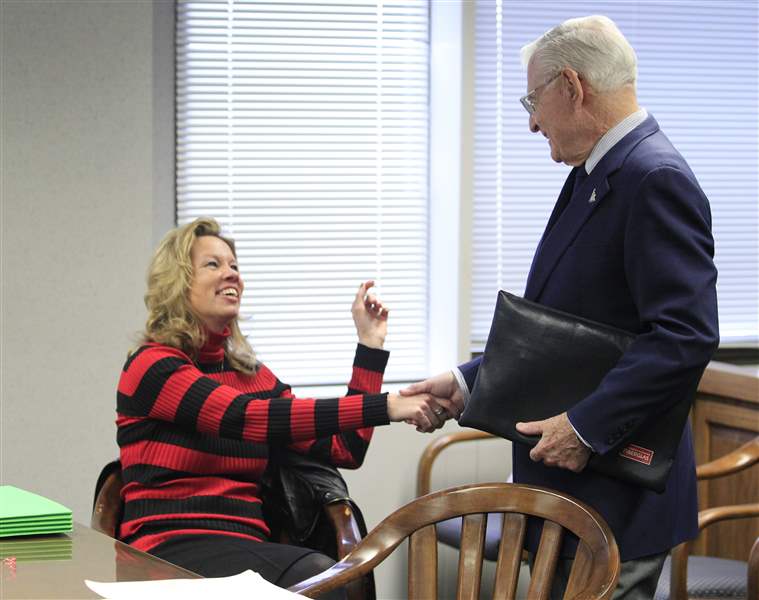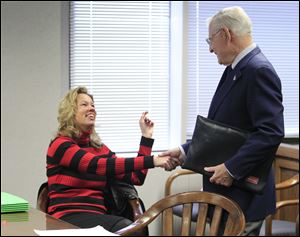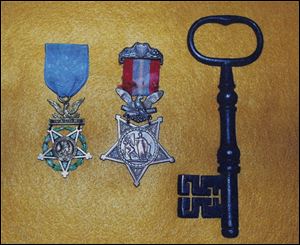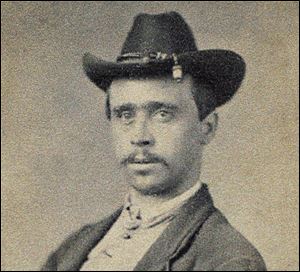
Truce called in feud over Civil War artifacts
Both sides get visitation rights to hero's medals, key to prison cell
2/23/2012
Linda Schwartz and her cousin Albert Ward of Timberlake, Ohio, shake hands. The case over ultimate ownership continues. The items will be encased in glass and stay with Mrs. Schwartz's attorney.
THE BLADE/ANDY MORRISON
Buy This Image

Linda Schwartz and her cousin Albert Ward of Timberlake, Ohio, shake hands. The case over ultimate ownership continues. The items will be encased in glass and stay with Mrs. Schwartz's attorney.
BOWLING GREEN -- A custody battle over three Civil War artifacts is far from over, but two cousins involved in the fight agreed in court Wednesday to a visitation plan of sorts.
Attorneys for Linda Schwartz of Perrysburg and her cousin, Albert Ward of Timberlake, Ohio, said the two have agreed to allow Mrs. Schwartz to take two Congressional Medals of Honor and a key from a Confederate prison that belonged to Sgt. Wilson W. Brown, a northwest Ohio man who took part in Andrews' Raid, to Kennesaw, Ga., April 12 and 13 for events commemorating the 150th anniversary of the well-known raid.
In the meantime, she is to have the items encased in glass and placed in the custody of her attorney, Brian Ballenger.
Mrs. Schwartz, a fourth-generation descendant of Mr. Brown, has had possession of his medals and the key he used to escape from a Confederate prison after the April 12, 1862, raid since her father's death in 2005.
Last month, Mr. Ward, a third-generation descendant, filed suit against Mrs. Schwartz in Wood County Common Pleas Court, claiming he had a superior right of possession and that Mrs. Schwartz had refused to share the artifacts with the family for "family reunions, historical convocations, and other events honoring the memory and valor of Wilson W. Brown." Mr. Ward said he filed the suit on behalf of the other descendants of Mr. Brown, the majority of whom want to see the artifacts placed in an appropriate museum, where they can be displayed and enjoyed by the public.

The artifacts will be taken to Kennesaw, Ga., in April for events commemorating the raid.
Attorneys for the two sides met privately for more than an hour Wednesday, then reconvened before Judge Alan Mayberry to outline the terms of a temporary agreement.
Harold Hanna, attorney for Mr. Ward, said that if Mrs. Schwartz cannot make the trip to the Southern Museum of Civil War & Locomotive History in Georgia in April, she is to notify his office so that another family member can take the items to the anniversary celebration.
Within seven days of the event, the memorabilia is to be returned to Mr. Ballenger "until further order of the court or conclusion of the case," Mr. Hanna said.
Mr. Ballenger was quick to add the medals and key would be placed in a safe deposit box. "Just for the record, so everyone knows, they're not at my house or my office," he said. "I've had plenty of crazy calls."
Judge Mayberry said the two sides are to meet with the court's mediator April 25.
If that is not successful in bringing about a resolution to the dispute, the case is to come before him for an initial pretrial hearing May 10.

Wilson W. Brown
Mrs. Schwartz declined to discuss the artifacts after the hearing but said, "We'll get it resolved."
Mr. Hanna said he is hopeful mediation will help the two sides find a resolution that so far has eluded them.
"Our mediator has a 70 percent success rate," Mr. Hanna said afterward. "This is a tougher kind of case for mediation because it's kind of an all-or-nothing thing. How we will come up with a compromise is difficult, but we certainly will continue that effort."
A locomotive engineer and member of the 21st Ohio Infantry Regiment, Mr. Brown was among the first U.S. soldiers to be awarded the Medal of Honor for his part in the raid and received a second one after the medal was redesigned in 1904. He died in East Toledo in 1916 and was buried in Wood County.